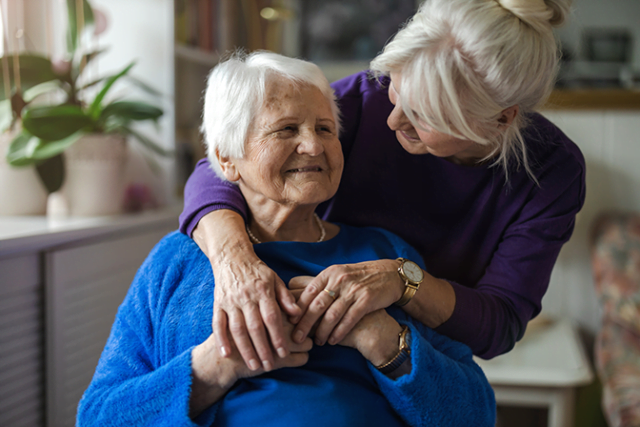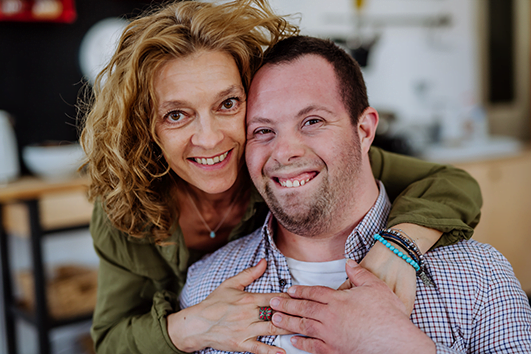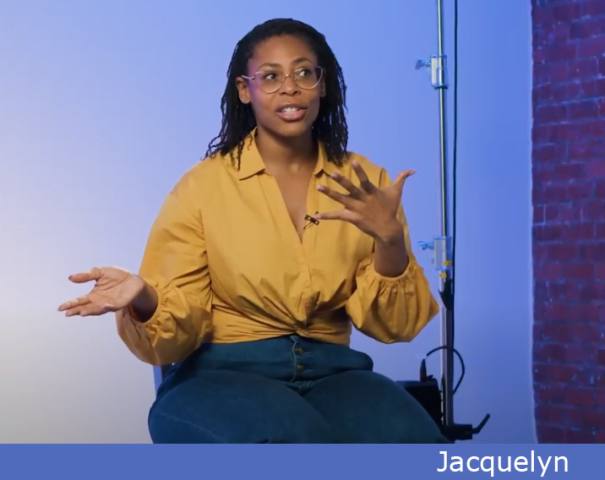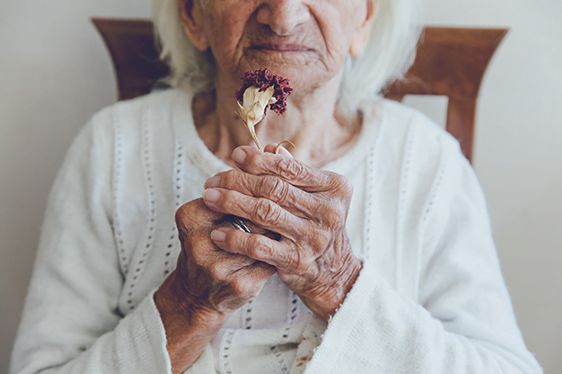
Four Caregiver Types: Do Any of These Look Familiar?
Aaron Blight and his wife were thrown into the role of caregiver when his mother-in-law was diagnosed with a brain tumor. The couple cared for her for more than five years, juggling her needs with raising their four children. Today, Blight combines a professorship at Shenandoah University in Winchester, Virginia, and writing about caregiving with running his company, Caregiving Kinetics, which provides training for professional and family caregivers.
In a recent interview, he discussed four different types of caregivers, whom he describes as “the unheralded and unrecognized” providers of unpaid care valued at some $500 billion per year. He credits Amanda Cooper at the University of Connecticut for the profiles, which she based on the online narratives written by family caregivers. Here is Blight’s take on them.

It seems that anyone who is a caregiver knows they are. But you say that isn’t necessarily the case?
Self-identification as a family caregiver is important. The professionals oriented around supporting families recognize this as crucial to accessing help. But a lot of people who are helping loved ones would not call themselves a caregiver. They say, “I’m just doing what any family member – husband, wife, son or daughter – would do.” Instead, they define their family role simply as being broader than it used to be. Also, the term caregiver is not a welcome label for many family members.
Why is recognizing yourself as a caregiver important?
Many family members and spouses think that, because of their family commitments or marital vows, they should be able to shoulder this alone. There’s also a cultural component to this. Certain cultural backgrounds, ethnicities and nationalities are more oriented toward caring for elders, so it’s viewed as a family obligation.
And why should caregivers understand where they fit into these four caregiver roles?
There’s a certain level of affirmation in it. You can see yourself and recognize that the things you’re struggling with are not unique to you. Others are going through the same thing. I also think that with some honest self-reflection, it might be a bit of a wake-up call. Sometimes caregiving has a way of creeping in and crowding out other things in your life, and one day you wake up and realize this has affected your emotional well-being.
Then what are you going to do about it? If you find yourself as the the Prisoner or the Crumbling Caregiver – neither of those identities is healthy. If you relate to those, how can you access help and change things so that you’ll be healthier and happier?
The Prisoner is the first caregiver type. Who gets into this situation and why?
This family caregiver feels like she has no choice in the decision to assume the role. Who else is going to do it but family? When we first took in my mother-in-law, we felt like somebody had to do it, and we were the ones.
Does this feeling stem from a poor relationship with the person they’re caring for?
Absolutely. In those situations where you don’t have an optimal relationship with your loved one, the assumption of the caregiver role is based more on a sense of obligation and less a sense of love. That makes it more difficult.
The Crumbling Caregiver. Isn’t exhaustion just a feature of being a caregiver, whether for an elderly parent or a child?
Not necessarily. I think it depends on a couple things. One is the care-related needs of your loved one. The poorer their health, the greater the care requirements. Combined with that is the capacity of the family member to provide that care. So when the needs of a loved one exceed the caregiver’s capacity to provide the care, that leads to exhaustion, burnout, and mental health-related symptoms for the caregiver.
Everyone has a different capacity too. You may already be stretched thin with your responsibilities at work, in the community, or taking care of other family members. Many family caregivers also have their own health challenges, which they’re coping with while caring for a loved who has worse conditions. The exhaustion can be physical, but it can also be mental and emotional. A less than ideal relationship between the caregiver and the parent or spouse takes an additional toll.
Does exhaustion tell you something isn’t working?
I do not judge any family caregiver. All the family caregivers are doing the best they can in a difficult situation.
Also, when you’re talking about care of the elderly or someone with chronic conditions or end-of-life care, the needs of the care receiver tend to increase over time. You may have started on the caregiving road with relatively small duties but because the loved one is getting worse, you find yourself doing more over time – to the point you physically can’t do it all. This can be especially true with individuals who have dementia because as it progresses to the severe stages, they need constant supervision and assistance. It really is more than any one person can handle.
The Companionate Caregiver. What does that mean and why is this important?
I like what Dr. Cooper did with that word, which blends the word compassion with the word companion. She’s describing people who are really focused on being with their loved one and showing love, compassion and support. While they can’t fix their loved one, they can just be there and show through their involvement that they care. If some caregivers do this out of an obligation, the Companionate Caregiver is motivated by love and aiming to do whatever they can to be there for their loved one.
Isn’t this focus on the relationship difficult for caregivers who are doing the heavy lifting the role requires?
I like to define the caregiver role as doing versus being. If you’re approaching it as a doing type of role, you have a never-ending to-do list and need to check off the boxes – housekeeping, managing affairs, transportation, medications. The list goes on and on. An exclusive focus on doing can run you ragged.
But for caregivers who frame their role as one of being, the to-do list isn’t as important. Being there for your loved one and being the companion and family member who is supportive, compassionate and loving – that becomes your primary focus. Maybe you bring in hired help to check some of the boxes on the doing.
The Redeemer Caregiver. What do you mean by this?
What Dr. Cooper referenced here is the enlightenment that comes as a result of adversity and traveling through the challenges of caregiving. Family caregiving is a transformational experience. After you’ve traversed this journey long enough, you start to appreciate things more. Caregiving shapes your values and your relationships. It forces you to reflect on what you’re doing in your life, how you’re spending your time, what is the meaning of this relationship you have with your loved one and how will you, with your loved one, get through a trial imposed on you due to a health condition.
Your loved one didn’t ask for the condition and you didn’t ask to be a caregiver. You have to manage and adapt, and you grow as a result of facing these trials. You might learn some things about yourself and your loved one in the process. A lot of family caregivers also describe a greater sense of purpose. They might see a change in their relationship with their loved one – the relationship may become more important. This is especially true when you’re accompanying your loved one up to and through death. That experience can shape your spirituality, your sense of identity, and what life means and what death means.
Can an individual fit in more than one caregiver type?
Yes. For me personally, for example, when caregiving was thrust upon me at a relatively young age, I was two types – the Prisoner and the Crumbling Caregiver. Eventually I came to understand how to make this work and to appreciate that my mother-in-law didn’t ask for this, and we were just doing the best we could. When we got close to the end of her life, we outsourced help and were able to focus on being a family and spending time with her before she died. And for me, that experience absolutely was life changing. It also changed my career and has led me to what I do today, working with caregivers. Some of that redeemed quality of being a caregiver – the fourth type – is found in my work.
For more of Blight’s thoughts and recommendations for caregivers, see his book, “When Caregiving Calls: Guidance as You Care for a Parent, Spouse, or Aging Relative.”
Squared Away writer Kim Blanton invites you to follow us @SquaredAwayBC on X, formerly known as Twitter. To stay current on our blog, join our free email list. You’ll receive just one email each week – with links to the two new posts for that week – when you sign up here. This blog is supported by the Center for Retirement Research at Boston College.







This article came at the right time for me.
I feel like a prisoner and every day I feel more like crumbling. I’d like to be companionate but my wife, for whom I’m trying to care, has a to-do list that seems never ending and doesn’t show appreciation when I check off any of those boxes day by day. I doubt that I’ll ever feel redemption.
No easy solutions here, but you’ve helped me focus more clearly on the differing roles and there are hints toward making progress through them.
I’ll call myself the lucky caregiver because I’ve never felt a need to define what I do for my loved ones. This articled wasn’t very helpful to me. I suppose I have been each type at some point but even the redeemer term seems like you are doing something out of obligation. I never feel that. Again, lucky caregiver… Lucky to be be able, lucky to have good relationships, lucky to be able to get rest. My heart breaks for those who feel trapped, unappreciated, or worn out.
Many of us are care givers – whatever might be the type, we do it
But when we have to do it, better to be companionate than prisoner, share/hire is the solution.